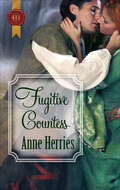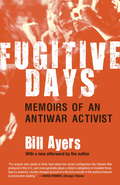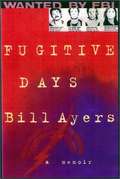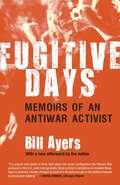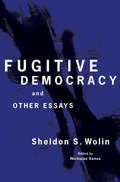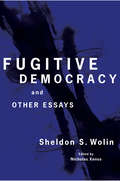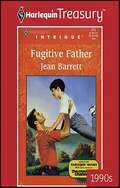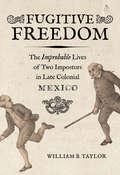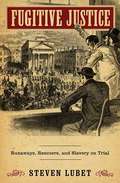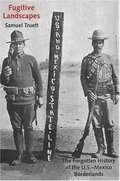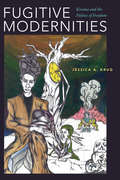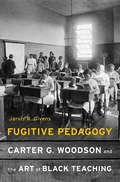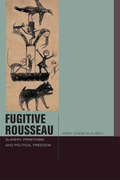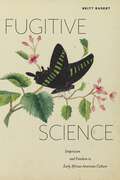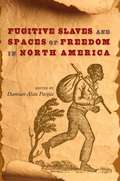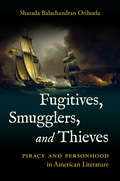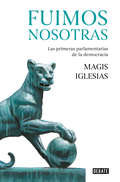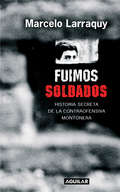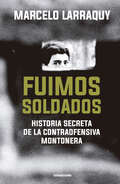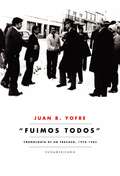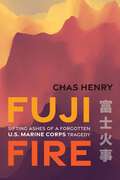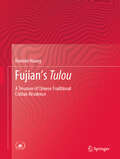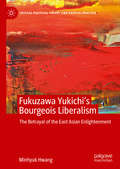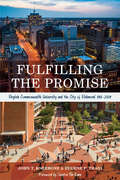- Table View
- List View
Fugitive Countess
by Anne HerriesYoung widow Marietta de Montcrief is fleeing for her life, with the accusation of murder and witchcraft hanging over her head. Innocent of any crime, she must protect the birthright of her infant son.It's not the first time dashing knight Anton of Gifford has rescued Marietta. But gone is the carefree youth who first stirred her senses…. With their enemies closing in, Anton will save Marietta—only this time he won't lose his head, or his heart, over the fugitive countess….
Fugitive Days
by Bill AyersBill Ayers was born into privilege and is today a highly respected educator. In the late 1960s he was a young pacifist who helped to found one of the most radical political organizations in U.S. history, the Weather Underground. In a new era of antiwar activism and suppression of protest, his story, Fugitive Days, is more poignant and relevant than ever.From the Trade Paperback edition.
Fugitive Days: A Memoir
by Bill AyersAyers helped found the Weather Underground in the late 1960s in response to the horror of the Vietnam War. He recounts a decade of living as a fugitive, stealing explosives, hiding from the law, and losing his beloved Diana Oughton in an explosion. The 2001 edition was published by Beacon Press. Annotation ©2004 Book News, Inc. , Portland, OR (booknews. com)
Fugitive Days: Memoirs of an Antiwar Activist
by Bill Ayers[Back cover] THE TRUE STORY OF THE 60S RADICAL AT THE CENTER OF THE RIGHT WING'S 2008 OBAMA SMEAR CAMPAIGN Bill Ayers was born into privilege and is today a highly respected educator. In the late 1960s he was a young pacifist who helped to found one of the most radical political organizations in U.S. history, the Weather Underground. In a new era of antiwar activism and suppression of protest, his story, Fugitive Days, is more poignant and relevant than ever.
Fugitive Democracy: And Other Essays
by Sheldon S. Wolin Nicholas XenosSheldon Wolin was one of the most influential and original political thinkers of the past fifty years. Fugitive Democracy brings together his most important writings, from classic essays such as "Political Theory as a Vocation," written amid the Cold War and the conflict in Vietnam, to his late radical essays on American democracy such as "Fugitive Democracy," in which he offers a controversial reinterpretation of democracy as an episodic phenomenon distinct from the routinized political management that passes for democracy today.The breathtaking range of Wolin's scholarship, political commitment, and critical acumen are on full display in this authoritative and accessible collection. He critically engages a diverse range of political theorists, including Thomas Hobbes, Karl Marx, Max Weber, Hannah Arendt, John Rawls, Michel Foucault, and Richard Rorty. These essays grapple with topics such as power, modernization, the sixties, revolutionary politics, and inequality, all the while showcasing Wolin's enduring commitment to writing civic-minded theoretical commentary on the most pressing political issues of the day. Here, Wolin laments the rise of conservatives who style themselves as revolutionary, criticizes Rawlsian liberals as abstract to the point of being apolitical, diagnoses postmodern theory as a form of acquiescence, and much more.Fugitive Democracy offers enduring insights into many of today's most pressing political predicaments, and introduces a whole new generation of readers to this provocative figure in contemporary political thought.
Fugitive Democracy: And Other Essays
by Sheldon S. Wolin Nicholas XenosSheldon Wolin was one of the most influential and original political thinkers of the past fifty years. In Fugitive Democracy, the breathtaking range of Wolin’s scholarship, political commitment, and critical acumen are on full display in this authoritative and accessible collection of essays. This book brings together his most important writings, from classic essays to his late radical essays on American democracy such as "Fugitive Democracy," in which he offers a controversial reinterpretation of democracy as an episodic phenomenon distinct from the routinized political management that passes for democracy today. Wolin critically engages a diverse range of political theorists, and grapples with topics such as power, modernization, the sixties, revolutionary politics, and inequality, all the while showcasing enduring commitment to writing civic-minded theoretical commentary on the most pressing political issues of the day. Fugitive Democracy offers enduring insights into many of today’s most pressing political predicaments, and introduces a whole new generation of readers to this provocative figure in contemporary political thought.
Fugitive Father
by Jean BarrettA DESPERATE FATHER...Only one thing mattered to Noah Rhyder. His son. Falsely accused, wrongly convicted, he'd held his little boy in his heart, his only wish to see Joel's face again. Now, freed by an instant's luck, he's on the run with nothing to lose, determined to reach his child.IN THE RACE OF HIS LIFEAs Joel's foster mother, Ellie Mathieson has sheltered him and kept him safe during the trial. Now she's the one person who can lead his father to him. Kidnapped, she's imprisoned more by Noah's honest eyes than by his strong arms. She'll risk it all, including her heart, to help this sensuous stranger. But will that be enough?
Fugitive Freedom: The Improbable Lives of Two Impostors in Late Colonial Mexico
by William B. TaylorCut loose from their ancestral communities by wars, natural disasters, and the great systemic changes of an expanding Europe, vagabond strangers and others out of place found their way through the turbulent history of early modern Spain and Spanish America. As shadowy characters inspiring deep suspicion, fascination, and sometimes charity, they prompted a stream of decrees and administrative measures that treated them as nameless threats to good order and public morals. The vagabonds and impostors of colonial Mexico are as elusive in the written record as they were on the ground, and the administrative record offers little more than commonplaces about them. Fugitive Freedom locates two of these suspect strangers, Joseph Aguayo and Juan Atondo, both priest impersonators and petty villains in central Mexico during the last years of Spanish rule.Displacement brought pícaros to the forefront of Spanish literature and popular culture—a protean assortment of low life characters, seen as treacherous but not usually violent, shadowed by poverty, on the move and on the make in selfish, sometimes clever ways as they navigated a hostile, sinful world. What to make of the lives and longings of Aguayo and Atondo, which resemble those of one or another literary pícaro? Did they imagine themselves in literary terms, as heroes of a certain kind of story? Could impostors like these have become fixtures in everyday life with neither a receptive audience nor permissive institutions? With Fugitive Freedom, William B. Taylor provides a rare opportunity to examine the social histories and inner lives of two individuals at the margins of an unfinished colonial order that was coming apart even as it was coming together.
Fugitive Justice: Runaways, Rescuers, and Slavery On Trial
by Steven LubetDuring the tumultuous decade before the Civil War, no issue was more divisive than the pursuit and return of fugitive slaves—a practice enforced under the Fugitive Slave Act of 1850. When free Blacks and their abolitionist allies intervened, prosecutions and trials inevitably followed. These cases involved high legal, political, and—most of all—human drama, with runaways desperate for freedom, their defenders seeking recourse to a “higher law” and normally fair-minded judges (even some opposed to slavery) considering the disposition of human beings as property.
Fugitive Landscapes: The Forgotten History of the U.S.-Mexico Borderlands
by Samuel TruettThis book reveals the forgotten story of their ambitious dreams and their ultimate failure to control this fugitive terrain. Focusing on a mining region that spilled across the Arizona--Sonora border, this book shows how entrepreneurs, corporations, and statesmen tried to domesticate nature and society within a transnational context. Efforts to tame a "wild" frontier were stymied by labor struggles, social conflict, and revolution. Fugitive Landscapes explores the making and unmaking of the U. S. -Mexico border, telling how ordinary people resisted the domination of empires, nations, and corporations to shape transnational history on their own terms. By moving beyond traditional national narratives, it offers new lessons for our own border-crossing age.
Fugitive Modernities: Kisama and the Politics of Freedom
by Jessica A. KrugDuring the early seventeenth century, Kisama emerged in West Central Africa (present-day Angola) as communities and an identity for those fleeing expanding states and the violence of the trans-Atlantic slave trade. The fugitives mounted effective resistance to European colonialism despite—or because of—the absence of centralized authority or a common language. In Fugitive Modernities Jessica A. Krug offers a continent- and century-spanning narrative exploring Kisama's intellectual, political, and social histories. Those who became Kisama forged a transnational reputation for resistance, and by refusing to organize their society around warrior identities, they created viable social and political lives beyond the bounds of states and the ruthless market economy of slavery. Krug follows the idea of Kisama to the Americas, where fugitives in the New Kingdom of Grenada (present-day Colombia) and Brazil used it as a means of articulating politics in fugitive slave communities. By tracing the movement of African ideas, rather than African bodies, Krug models new methods for grappling with politics and the past, while showing how the history of Kisama and its legacy as a global symbol of resistance that has evaded state capture offers essential lessons for those working to build new and just societies.
Fugitive Pedagogy: Carter G. Woodson and the Art of Black Teaching
by Jarvis R. GivensA fresh portrayal of one of the architects of the African American intellectual tradition, whose faith in the subversive power of education will inspire teachers and learners today. Black education was a subversive act from its inception. African Americans pursued education through clandestine means, often in defiance of law and custom, even under threat of violence. They developed what Jarvis Givens calls a tradition of “fugitive pedagogy”—a theory and practice of Black education in America. The enslaved learned to read in spite of widespread prohibitions; newly emancipated people braved the dangers of integrating all-White schools and the hardships of building Black schools. Teachers developed covert instructional strategies, creative responses to the persistence of White opposition. From slavery through the Jim Crow era, Black people passed down this educational heritage. There is perhaps no better exemplar of this heritage than Carter G. Woodson—groundbreaking historian, founder of Black History Month, and legendary educator under Jim Crow. Givens shows that Woodson succeeded because of the world of Black teachers to which he belonged: Woodson’s first teachers were his formerly enslaved uncles; he himself taught for nearly thirty years; and he spent his life partnering with educators to transform the lives of Black students. Fugitive Pedagogy chronicles Woodson’s efforts to fight against the “mis-education of the Negro” by helping teachers and students to see themselves and their mission as set apart from an anti-Black world. Teachers, students, families, and communities worked together, using Woodson’s materials and methods as they fought for power in schools and continued the work of fugitive pedagogy. Forged in slavery, embodied by Woodson, this tradition of escape remains essential for teachers and students today.
Fugitive Pieces: A Novel (Vintage International Ser.)
by Anne MichaelsAnne Michaels’ spellbinding début novel has quickly become one of the most beloved and talked-about books of the decade. As a young boy during the Second World War, Jakob Beer is rescued from the mud in Poland by an unlikely saviour, the scientist Athos Roussos, and he is taken to Greece, then, at war’s end, to Toronto. It is here that his loss gradually surfaces, as does the haunting question of his sister’s fate. Later in life, as a translator and a poet, and now with the glorious Michaela, Jakob meets Ben, a young professor whose own legacies of the war kindle within him a fascination with the older man and his writing. Fugitive Pieces is a work of rare vision that is at once lyrical, sensual, profound. With its vivid evocation of landscape and character, its unique excavation of memory and time, it is a wholly unforgettable novel that draws us into the lives of its characters with compassion and recognition.
Fugitive Rousseau: Slavery, Primitivism, and Political Freedom (Just Ideas)
by Jimmy Casas KlausenCritics have claimed that Jean-Jacques Rousseau was a primitivist uncritically preoccupied with “noble savages” and that he remained oblivious to the African slave trade. Fugitive Rousseau presents the emancipatory possibilities of Rousseau’s thought and argues that a fresh, “fugitive” perspective on political freedom is bound up with Rousseau’s treatments of primitivism and slavery.Rather than trace Rousseau’s arguments primarily to the social contract tradition of Hobbes and Locke, Fugitive Rousseau places Rousseau squarely in two imperial contexts: European empire in his contemporary Atlantic world and Roman imperial philosophy. Anyone who aims to understand the implications of Rousseau’s famous sentence “Man is born free, and everywhere he is in chains” or wants to know how Rousseauian arguments can support a radical democratic politics of diversity, discontinuity, and exodus will find Fugitive Rousseau indispensable.
Fugitive Science: Empiricism and Freedom in Early African American Culture (America and the Long 19th Century #10)
by Britt RusertHonorable Mention, 2019 MLA Prize for a First Book Sole Finalist Mention for the 2018 Lora Romero First Book Prize, presented by the American Studies AssociationExposes the influential work of a group of black artists to confront and refute scientific racism. Traversing the archives of early African American literature, performance, and visual culture, Britt Rusert uncovers the dynamic experiments of a group of black writers, artists, and performers. Fugitive Science chronicles a little-known story about race and science in America. While the history of scientific racism in the nineteenth century has been well-documented, there was also a counter-movement of African Americans who worked to refute its claims. Far from rejecting science, these figures were careful readers of antebellum science who linked diverse fields—from astronomy to physiology—to both on-the-ground activism and more speculative forms of knowledge creation. Routinely excluded from institutions of scientific learning and training, they transformed cultural spaces like the page, the stage, the parlor, and even the pulpit into laboratories of knowledge and experimentation. From the recovery of neglected figures like Robert Benjamin Lewis, Hosea Easton, and Sarah Mapps Douglass, to new accounts of Martin Delany, Henry Box Brown, and Frederick Douglass, Fugitive Science makes natural science central to how we understand the origins and development of African American literature and culture. This distinct and pioneering book will spark interest from anyone wishing to learn more on race and society.
Fugitive Slaves and Spaces of Freedom in North America (Southern Dissent)
by Damian Alan PargasThis volume introduces a new way to study the experiences of runaway slaves by defining different “spaces of freedom” they inhabited. It also provides a groundbreaking continental view of fugitive slave migration, moving beyond the usual regional or national approaches to explore locations in Canada, the U.S. North and South, Mexico, and the Caribbean. Using newspapers, advertisements, and new demographic data, contributors show how events like the Revolutionary War and westward expansion shaped the slave experience. Contributors investigate sites of formal freedom, where slavery was abolished and refugees were legally free, to determine the extent to which fugitive slaves experienced freedom in places like Canada while still being subject to racism. In sites of semiformal freedom, as in the northern United States, fugitives’ claims to freedom were precarious because state abolition laws conflicted with federal fugitive slave laws. Contributors show how local committees strategized to interfere with the work of slave catchers to protect refugees. Sites of informal freedom were created within the slaveholding South, where runaways who felt relocating to distant destinations was too risky formed maroon communities or attempted to blend in with free black populations. These individuals procured false documents or changed their names to avoid detection and pass as free. The essays discuss slaves’ motivations for choosing these destinations, the social networks that supported their plans, what it was like to settle in their new societies, and how slave flight impacted broader debates about slavery. This volume redraws the map of escape and emancipation during this period, emphasizing the importance of place in defining the meaning and extent of freedom. Contributors: Kyle Ainsworth | Mekala Audain | Gordon S. Barker | Sylviane A. Diouf | Roy E. Finkenbine | Graham Russell Gao Hodges | Jeffrey R. Kerr-Ritchie | Viola Franziska Müller | James David Nichols | Damian Alan Pargas | Matthew Pinsker A volume in the series Southern Dissent, edited by Stanley Harrold and Randall M. Miller
Fugitives, Smugglers, and Thieves: Piracy and Personhood in American Literature
by Sharada Balachandran OrihuelaIn this book, Sharada Balachandran Orihuela examines property ownership and its connections to citizenship, race and slavery, and piracy as seen through the lens of eighteenth- and nineteenth-century American literature. Balachandran Orihuela defines piracy expansively, from the familiar concept of nautical pirates and robbery in international waters to postrevolutionary counterfeiting, transnational slave escape, and the illegal trade of cotton across the Americas during the Civil War. Weaving together close readings of American, Chicano, and African American literature with political theory, the author shows that piracy, when represented through literature, has imagined more inclusive and democratic communities than were then possible in reality. The author shows that these subjects are not taking part in unlawful acts only for economic gain. Rather, Balachandran Orihuela argues that piracy might, surprisingly, have served as a public good, representing a form of transnational belonging that transcends membership in any one nation-state while also functioning as a surrogate to citizenship through the ownership of property. These transnational and transactional forms of social and economic life allow for a better understanding of the foundational importance of property ownership and its role in the creation of citizenship.
Fuimos nosotras: Las primeras parlamentarias de la democracia
by Magis IglesiasUna apasionante crónica sobre las ignoradas primeras parlamentarias de la democracia española. ¿Quién da voz a las mujeres que tomaron las riendas de la consolidación democrática de nuestro país? <P><P>En cuatro décadas de vida que cuenta ya la Constitución Española de 1978, mucho es el material que encontramos en relación a los parlamentarios constituyentes, padres de la Constitución o ponentes de la carta Magna. <P><P>Sin embargo, si en algo resultó revolucionaria la democracia española fue en el cambio que supuso para las mujeres. Un cambio impulsado por la presencia y la actividad de extraordinarias mujeres parlamentarias que abrieron las compuertas de un embalse que ha alimentado ríos de libertad para todas las españolas. <P><P>Ahora más que nunca, la sociedad en su conjunto necesita modelos y referentes de mujeres que hicieron historia y fueron pioneras en el ejercicio del poder político de la democracia: mujeres que dejaron huella. Con esta obra eminentemente periodística, Magis Iglesias pretende seguir esa huella, sacarla a la luz y promocionarla ampliamente mediante un relato biográfico de las desconocidas madres de la Constitución.
Fuimos soldados
by Marcelo LarraquyHistoria secreta de la contraofensiva montonera. Después de las exitosas obras Galimberti y López Rega, Marcelo Larraquy reconstruye las historias de ese puñado de hombres y mujeres a los que se reconoce como desaparecidos pero no como soldados, y a quienes la manipulación política dejó afuera del canon de la memoria setentista. Lazarte, un combatiente rebelde, expulsado de la guerrilla montonera, quiere matar a los miembros de la Conducción, a quienes responsabiliza por la desaparición de su hermana durante la dictadura militar. Para cumplir con su plan, necesita ser reincorporado y recuperar la confianza de los dirigentes. Se ofrece entonces para realizar una acción heroica, a la que difícilmente pueda sobrevivir: volver a la Argentina para interferir las emisiones televisivas de los partidos del Mundial '78 y propagar el discurso del comandante montonero Mario Firmenich. Contra todos los pronósticos, Lazarte alcanza su objetivo. De regreso en México, Montoneros lo readmite en sus filas y lo pone al frente de un pelotón de soldados con el que viaja nuevamente al país a cumplir otra misión peligrosa. El pelotón cruza la frontera con identidades fraguadas e intenta sobrevivir en la clandestinidad. Le faltan armas y dinero; algunos soldados desertan, otros desaparecen, pero el grupo tiene objetivos para cumplir, y Lazarte no olvida el suyo. Como ellos, otros combatientes montoneros tomaron las armas y regresaron al país entre 1978 y 1980 para combatir a la dictadura militar, mientras la sociedad festejaba en las calles los triunfos futbolísticos de esos años. Casi ninguno sobrevivió.
Fuimos soldados (Edición 2021): Historia secreta de la contraofensiva montonera
by Marcelo LarraquyDespués de las exitosas obras Galimberti y López Rega, Marcelo Larraquy reconstruye las historias de ese puñado de hombres y mujeres a los que se reconoce como desaparecidos pero no como soldados, y a quienes la manipulación política dejó afuera del canon de la memoria setentista. Lazarte, un combatiente rebelde, expulsado de la guerrilla montonera, quiere matar a los miembros de la Conducción, a quienes responsabiliza por la desaparición de su hermana durante la dictadura militar. Para cumplir con su plan, necesita ser reincorporado y recuperar la confianza de los dirigentes. Se ofrece entonces para realizar una acción heroica, a la que difícilmente pueda sobrevivir: volver a la Argentina para interferir las emisiones televisivas de los partidos del Mundial '78 y propagar el discurso del comandante montonero Mario Firmenich. Contra todos los pronósticos, Lazarte alcanza su objetivo. De regreso en México, Montoneros lo readmite en sus filas y lo pone al frente de un pelotón de soldados con el que viaja nuevamente al país a cumplir otra misión peligrosa. El pelotón cruza la frontera con identidades fraguadas e intenta sobrevivir en la clandestinidad. Le faltan armas y dinero; algunos soldados desertan, otros desaparecen, pero el grupo tiene objetivos para cumplir, y Lazarte no olvida el suyo. Como ellos, otros combatientes montoneros tomaron las armas y regresaron al país entre 1978 y 1980 para combatir a la dictadura militar, mientras la sociedad festejaba en las calles los triunfos futbolísticos de esos años. Casi ninguno sobrevivió.
Fuimos todos: Cronología de un fracaso 1976-1983
by Juan B. YofreContinuación de «Nadie fue», se centra entre los años de la dictadurahasta la guerra de Malvinas y sus consecuencias. «Nadie fue», el libro anterior de Juan B. Yofre, se convirtió en una delas grandes sorpresas editoriales de los últimos años. Sobre la base defuentes privilegiadas, narraba el desarrollo histórico de la Argentinade los años 70 hasta la caída de Isabel Perón. «Fuimos todos» es lafascinante continuación de aquel éxito: retoma los avatares de nuestrahistoria desde el 24 de marzo de 1976 hasta la aventura militar deMalvinas -que llevó al fin del Proceso- y sus consecuencias. Yofrerepite aquí su procedimiento periodístico, exhuma documentos, apuntes,informes, cartas, que ven la luz por primera vez. Hallazgos que muestranaspectos absolutamente desconocidos de un período de violencia y dancuenta del enfrentamiento entre los argentinos, ya no solamente de lasFuerzas Armadas y las organizaciones terroristas sino también de lascontinuas luchas intestinas del propio régimen castrense. Un eslabón másen la historia de la decadencia política argentina. Exhaustivamentedocumentado, polémico, revelador, Fuimos todos expone los hechos, comodice el autor, "sine ira et cum studio", es decir, para que el lectorsaque sus propias conclusiones y con la honesta intención de evitar quese repitan los nefastos errores del pasado reciente.
Fuji Fire: Sifting Ashes of a Forgotten U.S. Marine Corps Tragedy
by Chas HenryOn October 19, 1979, the largest, most intense tropical cyclone ever recorded propelled 5,500 gallons of gasoline into corrugated steel huts filled with U.S. Marines. The gas ignited, injuring seventy-three people, thirteen of them fatally. The Marine Corps commandant, a veteran of combat in World War II, Korea, and Vietnam, was stunned as he met scores of horribly burned survivors. &“Having witnessed a lot of bad things, ugly things,&” the general declared, &“none can compare to that experience.&” And yet this 1979 catastrophe on the slopes of Japan&’s iconic Mount Fuji remains all but forgotten except by those directly affected. Now, the fruits of Chas Henry&’s exhaustive four-year, two-continent investigation provide insight into what many have called the U.S. Marine Corps&’ worst-ever peacetime disaster. Fuji Fire shares the compelling and intimate stories of heartbreak and inspiration forged by these events while bringing to light new, critical analyses of the incident&’s causes and effects.
Fujian's Tulou: A Treasure of Chinese Traditional Civilian Residence
by Hanmin HuangThis book analyzes a large number of typical tulou buildings and compact communities in detail, and painstakingly studies the way of life practiced in these communities, their defense systems, building techniques, spatial features, antithetical couplets culture, and historical origins. As such, it offers readers access to a unique treasure of traditional civilian residence, while also representing a valuable asset for architects and researchers in architectural history, cultural relics and fine arts.
Fukuzawa Yukichi’s Bourgeois Liberalism: The Betrayal of the East Asian Enlightenment (Critical Political Theory and Radical Practice)
by Minhyuk HwangFukuzawa Yukichi’s Bourgeois Liberalism introduces readers to the East Asian Enlightenment led by Fukuzawa Yukichi, one of the most important figures in the intellectual history of modern Japan. Despite his impact on political theory and modern Japanese history, Fukuzawa remains under-researched in Western academia, and while a few English-language books have been written about Fukuzawa, none have dealt with his political theory. This book describes Fukuzawa as a character with universal relevance and a unique view of the Enlightenment tradition. Emphasizing the power of bourgeois liberalism and the debate regarding its potential for transforming the strict class-caste society of Tokugawa Japan, Hwang discusses Fukuzawa's belief in the significance of individual autonomy, progress, and liberal rule of law in developing his project of the East Asian enlightenment, as well as his supposed “betrayal” of his early commitments due to his existential desire for Western recognition of Japan’s greatness. The book ends with an analysis of the complex relation between liberalism and progress in the East Asian context.
Fulfilling the Promise: Virginia Commonwealth University and the City of Richmond, 1968–2009
by John T. Kneebone Eugene P. TraniFounded in Richmond in 1968, Virginia Commonwealth University (VCU) began with a mission to build a university to serve a city emerging from the era of urban crisis—desegregation, white flight, political conflict, and economic decline. With the merger of the Medical College of Virginia and the Richmond Professional Institute into the single state-mandated institution of VCU, the two entities were able to embrace their mission and work together productively. In Fulfilling the Promise, John Kneebone and Eugene Trani tell the intriguing story of VCU and the context in which the university was forged and eventually thrived. Although VCU’s history is necessarily unique, Kneebone and Trani show how the issues shaping it are common to many urban institutions, from engaging with two-party politics in Virginia and African American political leadership in Richmond, to fraught neighborhood relations, the complexities of providing public health care at an academic health center, and an increasingly diverse student body. As a result, Fulfilling the Promise offers far more than a stale institutional saga. Rather, this definitive history of one urban-setting state university illuminates the past and future of American public higher education in the post-1960s era.
